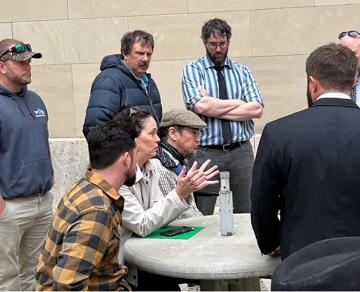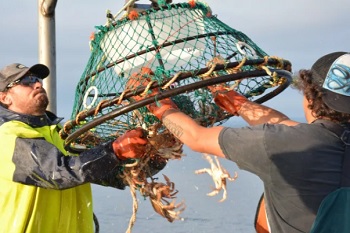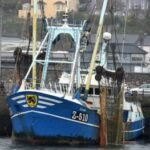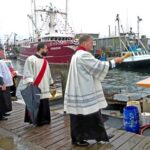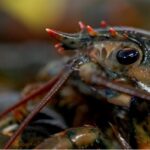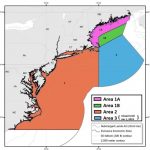Tag Archives: fishing rights
Brussels demand Keir Starmer surrenders UK fishing rights for EU deal
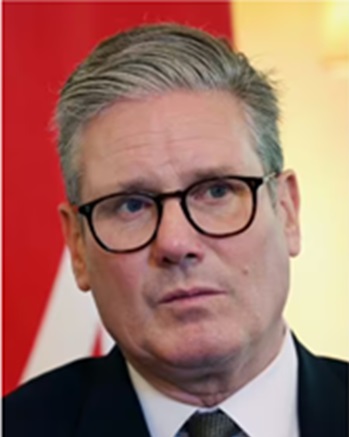 Brussels will demand Labour surrender fishing rights and follow EU laws for the first time since Brexit, it was reported last night. European leaders are said to want to make a new trade deal with Sir Keir Starmer dependent on Britain accepting European Court of Justice jurisdiction. It would be the first time since Brexit in January 2020 that the UK has had to follow EU law as part of its trading relationship with the bloc. It makes clear Brussels will demand key concessions on fishing, the European Court of Justice and youth mobility. Current fishing arrangements are seen by the National Federation of Fishermen’s Organisations as a ‘neo-colonial relationship with the EU’ as the UK has given up post-Brexit control of fishery resources. more, >>CLICK TO READ<< 06:39
Brussels will demand Labour surrender fishing rights and follow EU laws for the first time since Brexit, it was reported last night. European leaders are said to want to make a new trade deal with Sir Keir Starmer dependent on Britain accepting European Court of Justice jurisdiction. It would be the first time since Brexit in January 2020 that the UK has had to follow EU law as part of its trading relationship with the bloc. It makes clear Brussels will demand key concessions on fishing, the European Court of Justice and youth mobility. Current fishing arrangements are seen by the National Federation of Fishermen’s Organisations as a ‘neo-colonial relationship with the EU’ as the UK has given up post-Brexit control of fishery resources. more, >>CLICK TO READ<< 06:39
Some in seafood industry see Trump as fishermen’s friend, but tariffs could make for pricier fish
 The incoming administration of President-elect Donald Trump is likely to bring big changes for one of the oldest sectors of the U.S. economy, seafood, and some in the industry believe the returning president will be more responsive to its needs. Economic analysts paint a more complicated picture, as they fear Trump’s pending trade hostilities with major trading partners Canada and China could make an already pricy kind of protein more expensive to consumers. Conservationists also fear Trump’s emphasis on government deregulation could jeopardize fish stocks that are already in peril. But many in the commercial fishing and seafood processing industries said they are excited for Trump’s second presidency. They said they expect he’ll allow fishing in protected areas as he did in his first presidency, crack down on offshore wind expansion and cut back regulations they describe as burdensome. And they expect a marked shift from the administration of President Joe Biden, who prioritized ocean conservation and championed wind power from the start. Video, more, >>CLICK TO READ<< 10:26
The incoming administration of President-elect Donald Trump is likely to bring big changes for one of the oldest sectors of the U.S. economy, seafood, and some in the industry believe the returning president will be more responsive to its needs. Economic analysts paint a more complicated picture, as they fear Trump’s pending trade hostilities with major trading partners Canada and China could make an already pricy kind of protein more expensive to consumers. Conservationists also fear Trump’s emphasis on government deregulation could jeopardize fish stocks that are already in peril. But many in the commercial fishing and seafood processing industries said they are excited for Trump’s second presidency. They said they expect he’ll allow fishing in protected areas as he did in his first presidency, crack down on offshore wind expansion and cut back regulations they describe as burdensome. And they expect a marked shift from the administration of President Joe Biden, who prioritized ocean conservation and championed wind power from the start. Video, more, >>CLICK TO READ<< 10:26
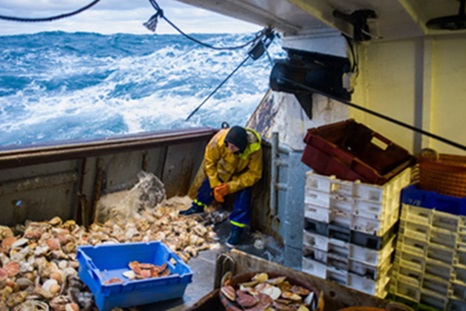
EU to demand continued fishing rights in British waters
The European Union (EU) will demand to keep its fishing rights in British waters, the bloc’s Brexit negotiator has told MEPs. The post-Brexit deal agreed by the EU saw its fishing quota in British waters cut by 25 per cent, but European fishermen were allowed continued access to parts of the UK’s coastal waters. As the deal nears its expiry in 2026, the EU is keen to start negotiating as soon as possible to keep its access to the UK’s exclusive economic zone (EEZ), which extends by up to 200 nautical miles from the coast. Government officials fear the EU will only renegotiate the Brexit trade agreement – a key part of Labour’s manifesto – if the UK guarantees European fishermen full access to its seas after 2026. more, >>CLICK TO READ<< 07:27
How fishing rights could prove key to the UK’s new negotiations with the EU
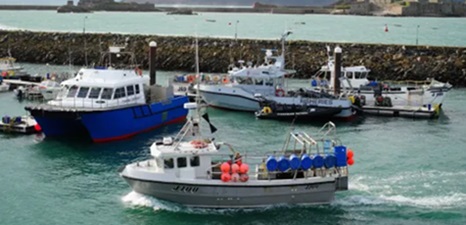 Over eight years after the Brexit referendum, crucial decisions about the UK’s future relationship with the bloc are about to be made. Decisions over softened immigration rules, the future of Gibraltar and wider economic access are all likely to be discussed as Labour prepares to negotiate in earnest for the first time with the EU as the Trade and Cooperation Agreement reaches its five-year renegotiation mark. Sir Keir Starmer, whose political career was catapulted into the limelight by his prominent support for a 2nd referendum on Brexit and an overall closer relationship with Europe, has sought to reset relations with the EU since becoming Prime Minister and will be scrutinized heavily over his choices in the negotiations. The discussions over fishing have seemingly jumped to the top of the EU’s priority list, following a number of disputes since the Trade and Co-operation Agreement. Despite relatively cordial relations between the UK and EU over the past few years, fishing has remained controversial. more, >>CLICK TO READ<< 06:47
Over eight years after the Brexit referendum, crucial decisions about the UK’s future relationship with the bloc are about to be made. Decisions over softened immigration rules, the future of Gibraltar and wider economic access are all likely to be discussed as Labour prepares to negotiate in earnest for the first time with the EU as the Trade and Cooperation Agreement reaches its five-year renegotiation mark. Sir Keir Starmer, whose political career was catapulted into the limelight by his prominent support for a 2nd referendum on Brexit and an overall closer relationship with Europe, has sought to reset relations with the EU since becoming Prime Minister and will be scrutinized heavily over his choices in the negotiations. The discussions over fishing have seemingly jumped to the top of the EU’s priority list, following a number of disputes since the Trade and Co-operation Agreement. Despite relatively cordial relations between the UK and EU over the past few years, fishing has remained controversial. more, >>CLICK TO READ<< 06:47
Fishing communities welcome B.C. intention to reform licensing and quotas
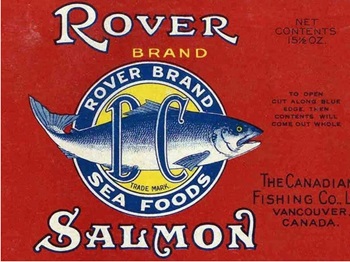 As part of the Coastal Marine Strategy unveiled last week, the province says it’s moving toward an owner-operator system for quota and licences. Under the new system, licence and quota holders would also need to be active fish harvesters — something advocacy groups and First Nations have been requesting for years. A transition to an owner-operator system would aim to eliminate the ability of a few giants to stake a majority claim on B.C.’s fishing grounds. One company alone, Jim Pattison’s Canfisco, owns double-digit percentages of some fish quotas, worth tens of millions of dollars. An owner-operator system is not a novel concept in the country. Atlantic Canada has had one in place for years, and as a result, has lower costs compared to B.C. more, >>CLICK TO READ<< 08:21
As part of the Coastal Marine Strategy unveiled last week, the province says it’s moving toward an owner-operator system for quota and licences. Under the new system, licence and quota holders would also need to be active fish harvesters — something advocacy groups and First Nations have been requesting for years. A transition to an owner-operator system would aim to eliminate the ability of a few giants to stake a majority claim on B.C.’s fishing grounds. One company alone, Jim Pattison’s Canfisco, owns double-digit percentages of some fish quotas, worth tens of millions of dollars. An owner-operator system is not a novel concept in the country. Atlantic Canada has had one in place for years, and as a result, has lower costs compared to B.C. more, >>CLICK TO READ<< 08:21
Brexit fury as fears grow Keir Starmer will give EU fishing boats access to UK waters
 The European Union will demand access to Britain’s fishing waters in return for Sir Keir Starmer’s reset in UK-EU relations, according to reports. The Prime Minister said he wants a “better deal” and spoke of resetting the UK’s relationship with Europe at the end of a European Political Community summit at Blenheim Palace, Oxfordshire, on Thursday (July 18). Brussels bureaucrats are reportedly preparing a list of “offensive interests” the bloc will deploy in future talks with London, according to the Daily Telegraph. Reports the EU would seek access to British fishing waters sparked outrage on social media, with Richard Tice MP, Deputy Leader of Reform UK, tweeting: “NO NO NO. We want our fishing waters back, not giving more away.” more, >>CLICK TO READ<< 12:21
The European Union will demand access to Britain’s fishing waters in return for Sir Keir Starmer’s reset in UK-EU relations, according to reports. The Prime Minister said he wants a “better deal” and spoke of resetting the UK’s relationship with Europe at the end of a European Political Community summit at Blenheim Palace, Oxfordshire, on Thursday (July 18). Brussels bureaucrats are reportedly preparing a list of “offensive interests” the bloc will deploy in future talks with London, according to the Daily Telegraph. Reports the EU would seek access to British fishing waters sparked outrage on social media, with Richard Tice MP, Deputy Leader of Reform UK, tweeting: “NO NO NO. We want our fishing waters back, not giving more away.” more, >>CLICK TO READ<< 12:21
Sipekne’katik First Nation granted a temporary adjournment to allow for mediation with the Crown
 A Nova Scotia Supreme Court judge has granted a joint request from the Sipekne’katik First Nation and the Attorney General of Canada to adjourn trial dates that would have aimed to settle treaty fishing rights disputes. The court has decided to give the involved parties until December 12, 2024, to have a defined and active mediation process in place, if not, proceeding with litigation would be re-examined. The Unified Fisheries Conservation Alliance (UFCA), which represents the interests of its members who are commercial fishers in the Gulf and Maritimes regions, asserts that the courts must finally decide the scope of Marshall rights for Indigenous Peoples. “The fact that the Sipekne’katik First Nation is attempting to settle treaty fishing rights issues outside of court is a historic precedent considering the court system has been at the center of Indigenous claims to the fishery and rights in particular for decades,” said Colin Sproul, President of the UFCA. more, >>CLICK TO READ<< 15:25
A Nova Scotia Supreme Court judge has granted a joint request from the Sipekne’katik First Nation and the Attorney General of Canada to adjourn trial dates that would have aimed to settle treaty fishing rights disputes. The court has decided to give the involved parties until December 12, 2024, to have a defined and active mediation process in place, if not, proceeding with litigation would be re-examined. The Unified Fisheries Conservation Alliance (UFCA), which represents the interests of its members who are commercial fishers in the Gulf and Maritimes regions, asserts that the courts must finally decide the scope of Marshall rights for Indigenous Peoples. “The fact that the Sipekne’katik First Nation is attempting to settle treaty fishing rights issues outside of court is a historic precedent considering the court system has been at the center of Indigenous claims to the fishery and rights in particular for decades,” said Colin Sproul, President of the UFCA. more, >>CLICK TO READ<< 15:25
New documentary reveals Scottish Government believe Rockall dispute over fishing rights could be resolved
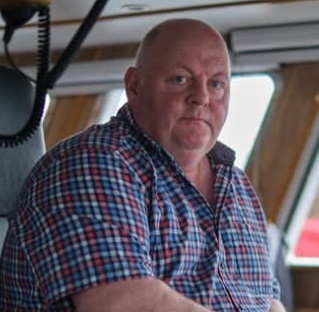 The sovereignty of the rock has been the source of a long running dispute between Ireland and the UK. The UK authorities claim Rockall is part of its territory lying within its territorial seas – a claim not recognized by Ireland. Ireland has not claimed ownership of the rock and does not recognise the British claim of sovereignty on the basis that uninhabited rocks should not be claimed by any state. The British Navy annexed Rockall in 1955 – hoisting the Union flag and cementing a brass plaque on the summit. It later sought to incorporate it into part of UK law in 1972. Video, more, >>CLICK TO READ<< 08:12
The sovereignty of the rock has been the source of a long running dispute between Ireland and the UK. The UK authorities claim Rockall is part of its territory lying within its territorial seas – a claim not recognized by Ireland. Ireland has not claimed ownership of the rock and does not recognise the British claim of sovereignty on the basis that uninhabited rocks should not be claimed by any state. The British Navy annexed Rockall in 1955 – hoisting the Union flag and cementing a brass plaque on the summit. It later sought to incorporate it into part of UK law in 1972. Video, more, >>CLICK TO READ<< 08:12
How the Boldt decision 50 years ago remade Pacific Northwest fishing
 Louie Ungaro waited out the turn of the tide, when chum salmon — he hoped — would hit his net. Fishing here is his tradition, a practice and a way of life as old as his people, the Muckleshoot Indian Tribe.“Elliott Bay ain’t going nowhere, and neither are we,” said Ungaro, a member of the tribe’s council and lifelong hunter and fisher. Yet it took violent protests and a decision appealed all the way to the U.S. Supreme Court to affirm their right to fish, explicitly stated in treaties signed by their ancestors nearly 170 years ago as settlers colonized the Pacific Northwest. The decision handed down by U.S. District Court Judge George Boldt 50 years ago next month was the result of sacrifices made by Native fishers and their families jailed and beaten while defending these rights. And yet now another threat looms over all they fought for: scarcity of the fish themselves. Photos, more, >>click to read< 08:53
Louie Ungaro waited out the turn of the tide, when chum salmon — he hoped — would hit his net. Fishing here is his tradition, a practice and a way of life as old as his people, the Muckleshoot Indian Tribe.“Elliott Bay ain’t going nowhere, and neither are we,” said Ungaro, a member of the tribe’s council and lifelong hunter and fisher. Yet it took violent protests and a decision appealed all the way to the U.S. Supreme Court to affirm their right to fish, explicitly stated in treaties signed by their ancestors nearly 170 years ago as settlers colonized the Pacific Northwest. The decision handed down by U.S. District Court Judge George Boldt 50 years ago next month was the result of sacrifices made by Native fishers and their families jailed and beaten while defending these rights. And yet now another threat looms over all they fought for: scarcity of the fish themselves. Photos, more, >>click to read< 08:53
Soo Tribe says it will appeal Great Lakes commercial fishing deal
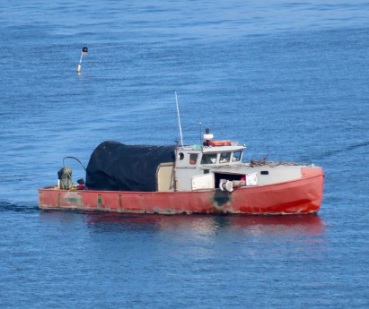 The Sault Ste. Marie Tribe of Chippewa Indians says it will appeal an agreement struck between four other tribes, federal regulators and state of Michigan to govern Great Lakes commercial and sport fishing. The tribe said Monday, Oct. 9 that it would appeal the agreement, which was approved by a federal judge on Aug. 24, with the U.S. Sixth Circuit court of appeals by Oct. 23. The tribe did not join the agreement, which was reached in December between the state and federal governments, and the Bay Mills Indian Community, the Grand Traverse Band of Ottawa and Chippewa, the Little River Band of Ottawa and Little Traverse Bay Bands of Odawa. The agreement divvies up fishing rights in parts of lakes Michigan, Huron and Superior; extending until 2047 a longstanding regulatory framework which has been under negotiation since it expired in 2020. The deal covers Great Lakes that fall within Michigan waters in which the tribes reserve fishing rights per the 1836 Treaty of Washington. >>click to read<< 18:29
The Sault Ste. Marie Tribe of Chippewa Indians says it will appeal an agreement struck between four other tribes, federal regulators and state of Michigan to govern Great Lakes commercial and sport fishing. The tribe said Monday, Oct. 9 that it would appeal the agreement, which was approved by a federal judge on Aug. 24, with the U.S. Sixth Circuit court of appeals by Oct. 23. The tribe did not join the agreement, which was reached in December between the state and federal governments, and the Bay Mills Indian Community, the Grand Traverse Band of Ottawa and Chippewa, the Little River Band of Ottawa and Little Traverse Bay Bands of Odawa. The agreement divvies up fishing rights in parts of lakes Michigan, Huron and Superior; extending until 2047 a longstanding regulatory framework which has been under negotiation since it expired in 2020. The deal covers Great Lakes that fall within Michigan waters in which the tribes reserve fishing rights per the 1836 Treaty of Washington. >>click to read<< 18:29

Unanimous N.C. Appeals Court Rules State Can Be Sued for Failing to Protect Fishing Rights
The decision could eventually lead to new restrictions on commercial fishing. The Appeals Court agreed to affirm a trial judge’s ruling in the case, Coastal Conservation Association v. State of N.C. The trial court had rejected the state’s attempt to have the case thrown out because of sovereign immunity. “Plaintiffs alleged the State breached this constitutional duty by ‘mismanaging North Carolina’s coastal fisheries resources.’ Specifically, Plaintiffs alleged the State has mismanaged the fisheries by ‘permitting, sanctioning, and even protecting two methods of harvesting coastal finfish and shrimp in State public waters’ — shrimp trawling and ‘unattended’ gillnetting,,, >click to read< 12:49
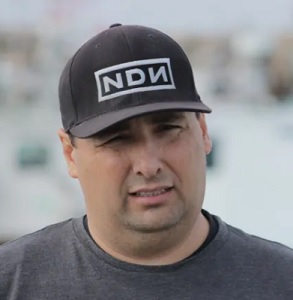
Removing DFO from Indigenous fishery negotiations an ‘integral’ step forward
Chief Mike Sack of the Sipekne’katik First Nation said the report, titled Peace on the Water, validates what he and his band have been saying about their right to fish since they launched a moderate livelihood fishery two years ago. The report calls for negotiations involving the Indigenous fishery to be handled by Crown-Indigenous Relations and Northern Affairs Canada, which Sack described as “the most integral” of the committee’s recommendations. “The treaty fishery model we presented over two years ago now is reinforced by each recommendation from the Senate,” Sack said in a statement. >click to read< 13:52
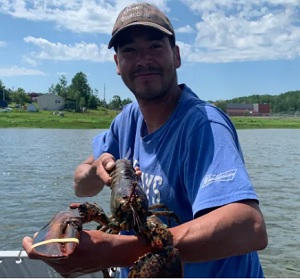
Pictou Landing reports peaceful season of moderate livelihood lobster fishery
Generations of Craig Francis’s family have fished the waters between Nova Scotia and Prince Edward Island, so being a part of Pictou Landing First Nation’s moderate livelihood fishery is a big deal for him. “It’s nice to have our rights recognized,” he said. “We were given these inherent rights, so to go out and do that on our own and have support with DFO and local fishermen is pretty good.” Francis is one of the community members designated by the First Nation to fish lobster under the plan. It’s the community’s first moderate livelihood plan with an understanding from Fisheries and Oceans Canada. >click to read< 06:57
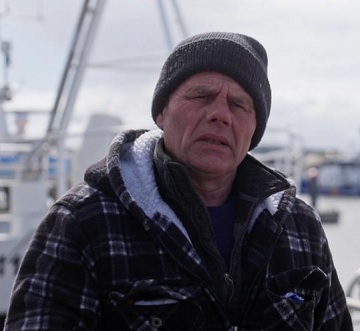
Troubled Waters – British Fishermen and Brexit
More than two years after Brexit, British fishermen are angry. They were promised more control over fishing rights in British waters, but what they’ve gotten is reduced income. Many of them voted Leave, but now they feel they’ve been let down. The fishing industry overwhelmingly supported Brexit. Darren Kenyon is a fisherman from Grimsby in North East England. He believed in the government’s Brexit promises – including more control over fishing rights in British waters — and voted Leave. But two and a half years after Brexit, he feels betrayed by Prime Minister Boris Johnson. Kenyon’s income is lower than it used to be and there’s more red tape than ever. >click to read< 12:10
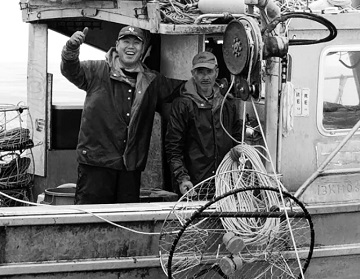
Reallocation: Fed changes to BC crab fishery could bankrupt some commercial fishermen
Commercial crab fishermen in British Columbia fear that changes to the way they can fish for Dungeness crab off the west coast of Vancouver Island could push some small, family operations out of business. This year however, crab fishermen like Jason Voong, 33, may not be able to harvest enough crabs to stay in business following changes announced by the federal government in December to reallocate half of the licenses available in the area to local First Nations. “I fully support, and the fishers support reconciliation, it’s just a process that’s wrong right now the way DFO has treated the commercial fleet and the five nations.” >click to read< 09:41
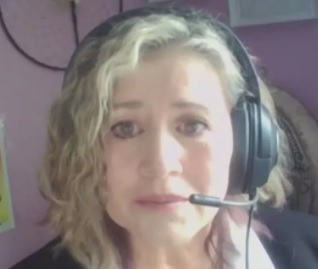
Mi’kmaw negotiator advocates for reduction in commercial catches to bolster treaty fishery
A top Mi’kmaw negotiator insisted commercial catches should be reduced anyway to ensure the treaty right is realized, while the president of a commercial fishermen’s association responded that enough has been done and the failure rests with Ottawa and First Nation leaders. “You heard from the chiefs, the buy-back program hasn’t been successful. So maybe at this point, Canada and DFO have to be more aggressive in taking back access  for the Mi’kmaw people and Indigenous people,” Janice Maloney told the committee. Colin Sproul, president of the Unified Fisheries Conservation Alliances, challenged the demand. Sproul represents 1,900 commercial fishermen. “It’s clearly unfair and un-Canadian to repossess access to the fishery from coastal communities without any consultation or compensation,” Sproul said. >click to read< 17:31
for the Mi’kmaw people and Indigenous people,” Janice Maloney told the committee. Colin Sproul, president of the Unified Fisheries Conservation Alliances, challenged the demand. Sproul represents 1,900 commercial fishermen. “It’s clearly unfair and un-Canadian to repossess access to the fishery from coastal communities without any consultation or compensation,” Sproul said. >click to read< 17:31
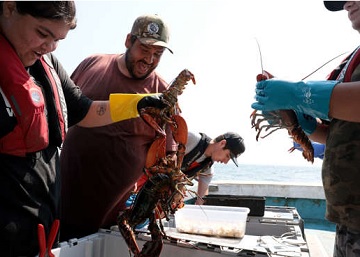
As lobster population booms off Canada, tensions rise between Indigenous and commercial fishermen
Under the close watch of federal officers on surrounding patrol vessels, Robert Sack navigated his old boat toward his clandestine traps in the cold waters that his people have fished for centuries, expecting to be arrested at any moment.,, Each trap had a special tag belonging to their band of the Indigenous Mi’kmaw people, who insist that a 269-year-old treaty grants them the right to fish when and how they want. But the government has rejected their assertion, and officers have seized their traps, confiscated their boats, and even arrested some of their fishermen. >click to read< 07>14
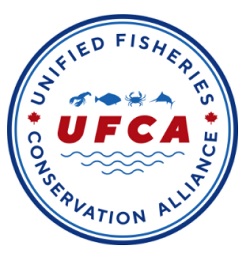
UFCA Granted Intervenor Status In Sipekne’katik Court Case
The Unified Fisheries Conservation Alliance has been granted intervenor status in another court case involving indigenous fisheries. They will be part of the Notice of Application brought by the Sipekne’katik First Nation against the Attorney General of Canada to challenge the regulation and enforcement of Indigenous fishing activities. UFCA President Colin Sproul discusses why it’s important for them to be involved. >click to read< 09:12
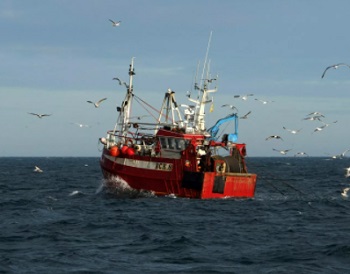
Danish Fisheries Hit by Crisis in Aftermath of Brexit
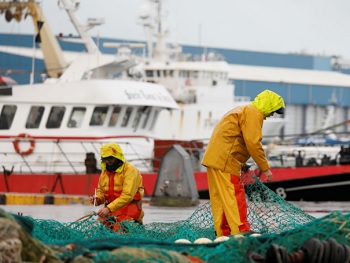
Extortion: France will reduce Jersey electricity supply this winter, unless fishermen granted licences for British waters
Speaking on Friday, outspoken French European Affairs Minister Clement Beaune said his government would hold firm against Britain and continue to demand more fishing licences. The European minister said that France may be forced to cut electricity, although not totally, to the Channel Island of Jersey, a self-governing dependency of the United Kingdom, during the winter as part of a “targeted” retaliation in the fishing dispute. >click to read< 07:39
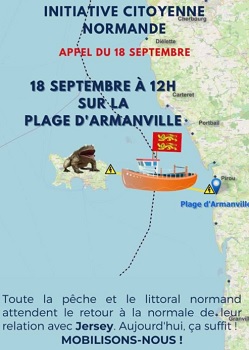
Normandy and Brittany Fishermen to protest Saturday
Fishermen from Normandy and Brittany are due to stage a protest at the French end of one of the undersea cables that supplies Jersey with electricity on Saturday. The demonstration is due to take place on the beach at Pirou, a few miles south of Portbail, ahead of the 30 September deadline for fishermen to submit data required to operate in Jersey waters beyond the end of this month. Earlier this year, French Minister of the Sea Annick Girardin, threatened that France could cut off Jersey’s connection with the French grid over the row on fishing rights. >click to read< 13:53

Michael Gove’s startling Brexit admission: ‘EU will continue to have access to UK waters
Despite Downing Street calling a “mutual compromise”, it does seem Prime Minister Boris Johnson capitulated on one of the most contentious areas of Brexit trade talks: fishing rights. The UK wanted any fishing agreement to be separate from the trade deal with access negotiated annually in a similar fashion to Norway’s agreement with the bloc. Norway is an independent coastal state, with the rights and responsibilities under international law associated with that status. Stocks shared with the EU are managed through annual bilateral negotiations. Each autumn these talks set total allowable catches on the basis of scientific advice. This contrasts starkly with the position of the UK fishing industry within the EU’s Common Fisheries Policy, something the EU wanted to maintain at all costs. >click to read< 08:14
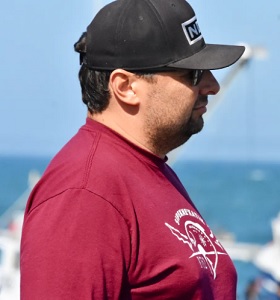
The Mi’kmaq fishing dispute: What the treaties said and how the wording could affect a future fishery
“We have a treaty right,” said Chief Mike Sack, wearing a hat emblazoned with Honour Treaties, when asked why the band had renamed their effort from the “moderate livelihood” fishery they launched last fall. The latter term was coined by the Supreme Court of Canada in its 1999 Marshall decision. But the decision that acknowledged a moderate livelihood treaty right also stated the authority to regulate, after consultation with First Nations, is held by the federal fisheries minister. With Sipekne’katik fishers setting traps under a self-regulated treaty fishery and federal officers hauling them and arresting Chief Sack for questioning on suspicion of inciting an illegal fishery, the question is raised: what do the treaties say? >click to read< 10:21
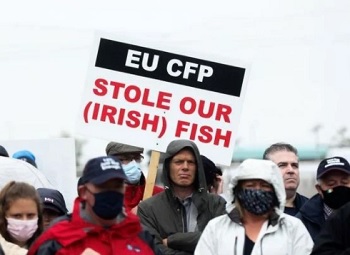
Ireland’s fishermen and farmers fight the Brexit fallout
Ireland’s fishermen and farmers took to Dublin to protest what they feel are unfair regulations. They are not happy with the Irish government either, which they say is failing to stand up for them. The issues involved for our fishermen and farmers are different, of course, but they go back to the same roots, as we will explain in a moment. First the fishermen. In the middle of last week, a huge flotilla of fishing boats sailed up the Liffey,,, It was the most picturesque protest we have seen here in a long time. >click to read< 18:12
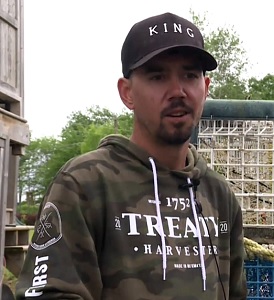
Mi’kmaw harvester wants lobsters seized by DFO accounted for
A Mi’kmaw lobster harvester wants to know what happened to his lobster after finally getting his fishing gear back from DFO,,, The gear had been sitting in a federal fisheries compound since then, and Matt Cope of Millbrook First Nation spent months trying to get it back. When Cope unloaded his gear this week, he was shocked to find damaged traps with ropes cut. “Traps aren’t cheap, ropes not cheap,” he said. “When they’re taking it for months at a time, and just all of a sudden giving it back when it’s all damaged, there’s no way we can fish like that.” >click to read< 08:50

Jaime Battiste: Balancing conservation and fairness in a ‘moderate livelihood’ for Indigenous fishermen
What is fair to the Mi’kmaq, who have been deprived of their legal right to a practice passed down for generations? What is fair to the commercial fishermen, many of whom today are of Mi’kmaq descent, who depend on the fishery and healthy stocks for their own livelihoods? There is no easy answer. The report addresses two misconceptions that have added fuel to this fire.,,, As someone who is fluent in the Mi’kmaw language, the Mi’kmaw language has no way to describe “an individual unfettered right, to accumulate wealth.” In fact, the closest would be a pejorative term that’s closer to greed. Much like the how the government’s right to regulate has limits, the right to a moderate livelihood also has its limits and responsibilities. >click to read< 09:42
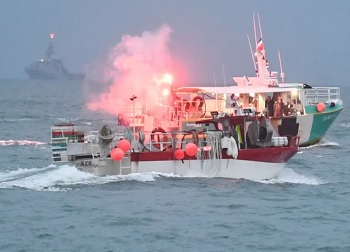
CRASH, BANG, SCALLOP! – Warships off the coast! French trawler rams UK boat as Jersey fishing stand-off escalates
Britain and France have both dispatched warships to the Channel island of Jersey Thursday amid concerns of a possible blockade of the island by French boats, a dramatic escalation in a row over rights to fish in the waters post-Brexit. >click to read< – French trawler rams UK boat – The British ship owned by Jonathan Ruff was hit by the French vessel Lasgot as he went out to sea as a blockade of French boats arrived near St Helier marina. Fisherman Josh Dearing described the appearance of the French boats, some letting off flares, as “like an invasion” and he welcomed the presence of Royal Navy ships in the region. video, photos, >click to read< CRASH, BANG, SCALLOPS – Jonathan Ruff’s boat was bashed in the stern by the French vessel Lasgot as he bravely went out to sea to face the group of 100 “invaders”. Video, photos, >click to read< 09:04
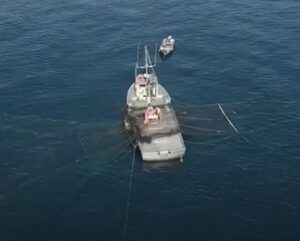
Inland Fisheries: A big fight in Lansing over fishing rules on the Great Lakes
Dana Serafin still hauls in 20,000-pound boatloads of whitefish to supply regional restaurants and markets, Native whitefish, the main livelihood for Serafin and other Great Lakes commercial fishermen, have been in decline for years amid changes to the food web, replaced in Serafin’s nets by healthier populations of walleye and lake trout that he’s not allowed to keep. Chinook salmon, once a favorite of recreational anglers on lakes Michigan and Huron, have also plummeted in Lake Michigan, and all but disappeared from Lake Huron. Battles are brewing over fishing rights from recreational, commercial, Native American, and environmental group meddling. Video, >click to read< 13:41






